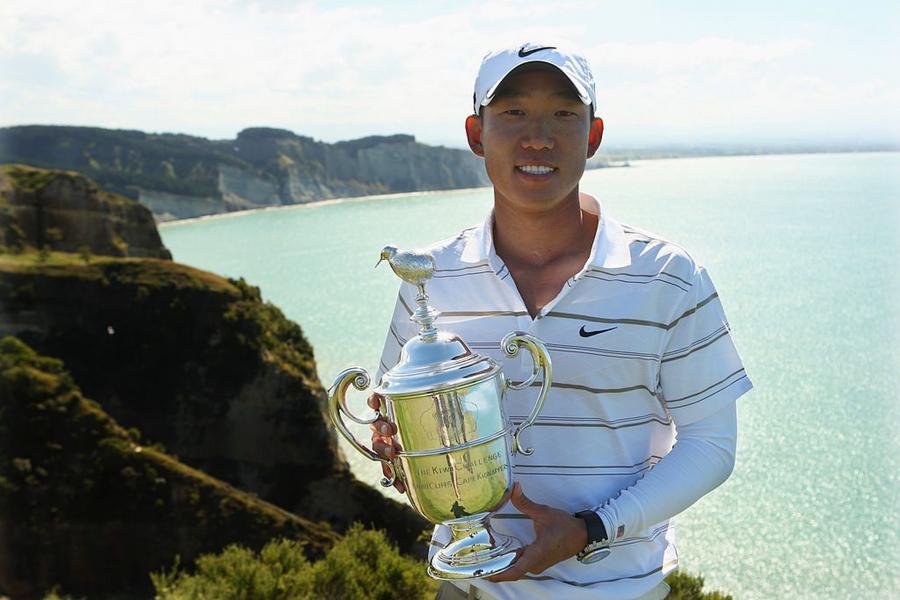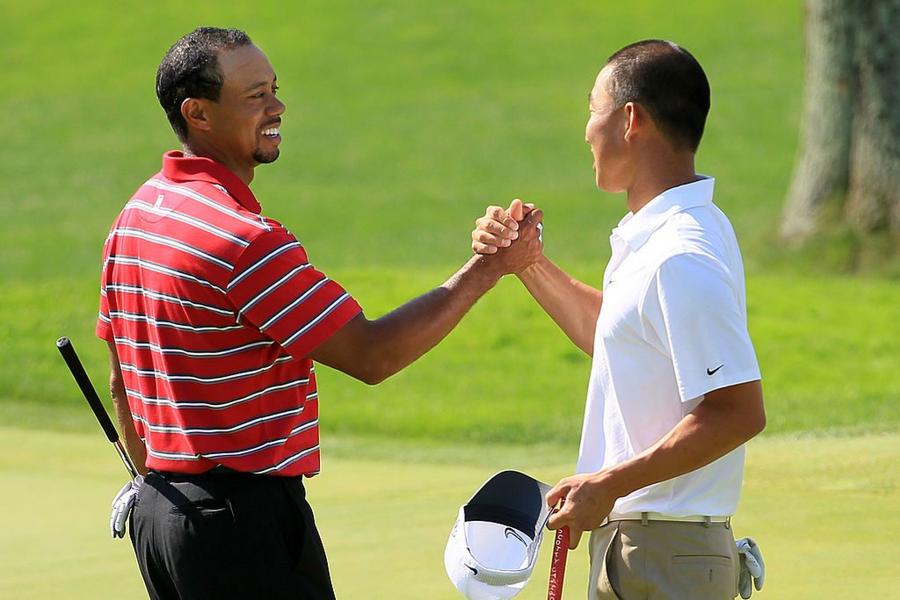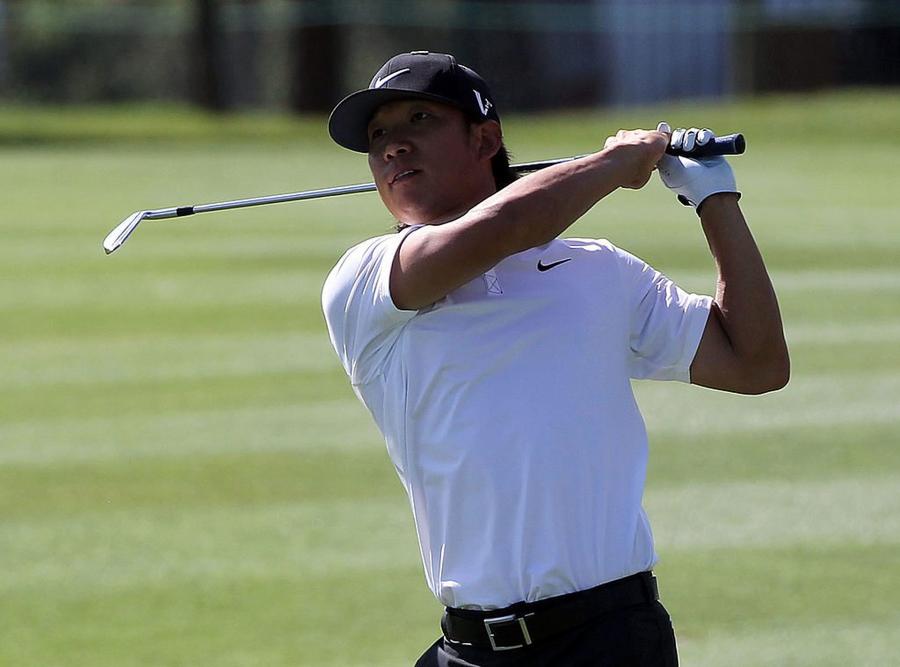At some point in every athlete's career, they will face the difficult prospect of giving up their beloved sport and retiring forever. Knees give out; backs ache; reflexes slow down. Rookies pop up left and right, gunning for your job. When it is time to call it quits, hopefully, every pro athlete finds himself or herself looking back at a very long career full of amazing memories, accomplishments, and big paychecks. Everything we just mentioned is precisely what makes the story of professional golfer Anthony Kim so unusual.
Back in 2014, Anthony Kim should have been in the prime of his career. A career that could have gone on for at least another decade or more. That would bring us to the present. So why did Anthony Kim become a ghost? A recluse. A mysterious cult hero. The game's biggest "what could have been?" This is the unusual story of a professional athlete who woke up one day and realized he's worth more injured than continuing to play his sport.
Early Life And Rise To Stardom
Anthony Kim was born on June 19, 1985, in Los Angeles, California, the only child of Korean immigrants. Much like Tiger's father, Earl Woods, Anthony's father, Paul loved golf and dreamed that his son would someday become a pro. Paul pushed his son to practice relentlessly, but there weren't a lot of good golfing opportunities near their home in the Koreatown section of Los Angeles. So, what was their solution? At 16, Anthony moved into his own apartment 130 miles away in La Quinta, California (near Palm Springs). He attended La Quinta High School and continued perfecting his golf game. This unusual arrangement seemingly paid off when Anthony was awarded a full-ride scholarship to the University of Oklahoma.

Phil Walter/Getty Images
Anthony attended Oklahoma for three years before turning pro in 2006 at the age of 21. In his very first tournament, he tied for second and took home $300,000. By the end of his first year, Anthony finished in the top 10 of four different tournaments. Those are very respectable stats for a rookie. He entered the 2007 US Open in 57th place and ended up shooting the second lowest round of the tournament. He walked away ranked 20th in the world.
Anthony won his first PGA tour in May 2008 at the Wachovia Championship. His score still stands as the lowest in that tournament's history. He won a second PGA tournament a month later, making him only the second American under the age of 25 to win two PGA tournaments in one year since Tiger Woods in 2000. When Anthony proved to be a critical component in the United States' 2008 Ryder Cup Victory, many analysts started calling him the next big thing in golf. He jumped up to #14 in the world rankings.
Anthony Kim boosters who were predicting greatness were not disappointed when he went on to set the record for most birdies in a single round at the 2009 Masters Tournament in Augusta. In April 2010, he won the Shell Houston Open. That win made him only the fifth player in the last 30 years to win three PGA tournaments before the age of 25. One week later, Anthony finished third at the 2010 Masters, taking home $510,000.

Tiger Woods and Anthony Kim / Andy Lyons/Getty Images
Career Earnings
Between 2006 and 2011, Anthony earned $12.17 million on the course. He also earned several million from an endorsement deal with Nike (that is technically still active to this day). He earned $6 million from his Nike deal in 2009 alone, and Anthony's highest earning year on the course was 2008, when he took home $4.6 million. That was enough to make him the sixth highest earning golfer in that year. Just four short years later, Anthony's career fell off the map. He went from earning over $1 million in 2011 to earning just $34,000 in 2012. He has earned no money in 2013 or 2014.
Injuries
The reason Anthony stopped earning so abruptly is that beginning in 2012, he started to have problems with his wrists and elbows. In June 2012, he had surgery to repair the Achilles tendon in his left leg. The surgery was expected to put him on the sidelines for 9-12 months.
He was technically eligible to play in the 2013 season but did not appear in a single event that whole year.
Disability Insurance: To Play or Not to Play? That is The Question.
Back in late 2014, Anthony was faced with an impossible decision. He could try to get better and re-join the PGA tour… or… he could stay retired forever. As it turned out, Anthony had an insurance policy that would pay him a little under $20 million if he had a career-ending injury. Best of all, the insurance policy paid out tax-free.
As an anonymous friend explained to an interviewer at the time:
"It's significantly north of [$10 million]. Not quite 20, but close. That is weighing on him very much. He's trying to weigh the risk of coming back. The way he's phrased it to me is, 'If I take one swing on Tour, the policy is voided.'"
Let's assume the policy was worth $17 million tax-free. If Anthony re-joined the tour, he would have had to earn at least $40 million on the course and from endorsements to have the same amount of money after taxes. And as a reminder, between 2006 and 2011, his absolute peak, he earned right around $20 million total from all sources. What were the odds Anthony would go on to earn $40 million?
What would you have done? And what did Anthony end up doing???

Anthony Kim / Sam Greenwood/Getty Images
Fast forward to the present.
Anthony Kim has not played in a professional event since 2012. He played in a charity event in 2016. In 2019, he told a fan that his golf game was "nonexistent." So, apparently, Anthony has chosen to take the permanently injured route.
But that's not the end of our story!
Last week it was reported that – after over a decade on the sidelines – Anthony was considering coming out of injured retirement to join either LIV Golf or the PGA Tour. If the rumors prove true, it's unclear what this would mean for his insurance policy. One would assume that he would have to re-pay some or even all of that insurance policy.
/2024/03/GettyImages-2053039555.jpg)
/2013/08/anthony.jpg)
/2013/08/GettyImages-496221170.jpg)
/2010/08/Jim-Furyk.jpg)
/2020/02/rory-mcilroy.jpg)
/2024/07/Joaquin-Niemann.jpg)
/2020/07/mlp.jpg)
/2010/01/Deryck-Whibley.jpg)
/2020/07/jl.jpg)
:strip_exif()/2020/06/taylor.png)
/2010/01/GettyImages-183679600.jpg)
/2022/10/Anne-Murray.jpg)
/2014/09/Kim-Delaney.jpg)
/2009/11/Tim-Duncan.jpg)
/2023/01/lance-armstrong.jpg)
/2021/04/Sara-Gilbert.jpg)
/2025/03/Kelli-Ferrell.jpg)
/2010/05/Jaleel-White.jpg)
/2013/02/Walt-Frazier.jpg)
/2011/04/Mike-Fisher.jpg)
/2023/05/brian-den.png)
/2021/03/Morgan-Wallen2.jpg)
/2020/03/kid-rock.jpg)